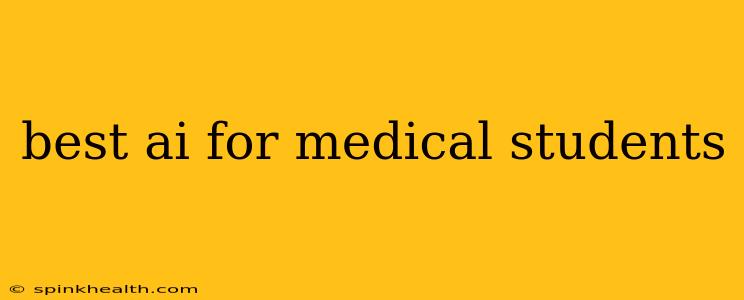The Best AI Tools for Medical Students: A Lifeline in the Labyrinth of Learning
The life of a medical student is a whirlwind – a relentless barrage of lectures, labs, and late nights fueled by caffeine and the sheer force of will. Navigating this intense period requires resilience, dedication, and… a little help from technology. Artificial intelligence (AI) is no longer a futuristic fantasy; it's a powerful tool that's transforming the way medical students learn, research, and prepare for their future careers. But with so many AI tools popping up, how do you choose the best ones? Let's dive in.
This isn't just a list of tools; it's a story of how AI is revolutionizing medical education, told through the lens of a fictional student, Alex, navigating their demanding curriculum.
Alex, a bright and driven second-year medical student, found themselves drowning in information. The sheer volume of material felt overwhelming, and effective study strategies seemed elusive. That's when they discovered the transformative power of AI.
What AI Tools Can Help Medical Students with Their Studies?
This question is at the heart of it all. Alex's journey started with exploring several key AI applications that directly address the challenges faced by medical students.
1. AI-Powered Note-Taking and Summarization Tools:
Alex initially struggled to keep up with the fast-paced lectures. The sheer amount of information felt overwhelming, leading to incomplete notes and missed details. That's when they stumbled upon AI-powered note-taking and summarization tools. These tools transcribe lectures in real-time, creating clean, organized notes. They also go beyond simple transcription; many can automatically summarize key concepts, highlighting important information and creating concise study guides. This significantly reduced the time spent on manual note-taking and improved comprehension.
2. AI-Driven Medical Diagnosis Assistance:
One of Alex's biggest fears was misdiagnosing a patient. Fortunately, AI-powered diagnostic tools offer invaluable assistance. These tools aren't meant to replace human judgment, but rather, to enhance it. By analyzing patient data, including symptoms, medical history, and test results, these tools can suggest possible diagnoses, helping students develop a more comprehensive understanding of various conditions and differential diagnoses.
3. AI for Medical Image Analysis:
Radiology, pathology, and other image-heavy disciplines often presented a huge challenge. Identifying subtle details in medical images requires extensive training and experience. Luckily, many AI tools excel at analyzing medical images, highlighting key features and anomalies, aiding students' learning and improving their diagnostic skills. It's like having a seasoned radiologist providing real-time feedback during their studies.
4. AI-Powered Research and Literature Review Tools:
Keeping up with the latest research in the ever-evolving field of medicine is a monumental task. Luckily, Alex discovered AI-powered research tools that streamline the literature review process. These tools use natural language processing to quickly identify relevant research articles, summarizing key findings and saving Alex countless hours of manual searching.
5. AI for Personalized Learning and Feedback:
Alex found that personalized learning is key to mastering complex concepts. AI-powered educational platforms provide adaptive learning experiences, tailoring the difficulty and content to the student's individual needs and progress. These platforms offer instant feedback, helping Alex to identify their weaknesses and focus on areas that require improvement.
What are the limitations of using AI in medical education?
While AI offers remarkable benefits, Alex also learned that these tools have limitations. They emphasized the importance of critical thinking and human oversight. AI tools are powerful aids, but they shouldn't replace the fundamentals of medical education, including hands-on experience, clinical rotations, and interaction with patients and mentors.
Alex's journey highlights the transformative power of AI in medical education. While choosing the "best" AI tool depends on individual needs and preferences, the key is to embrace these tools strategically, using them to enhance – not replace – traditional learning methods. The future of medicine is undoubtedly intertwined with AI, and medical students who embrace this technology will be well-equipped to navigate the complexities of this exciting field.

